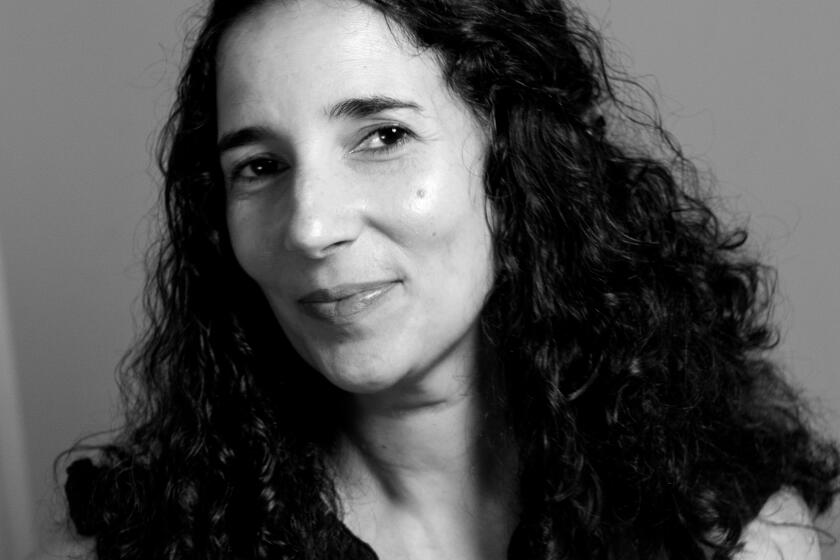A journalist grapples with her new identity as an Army wife

- Share via
On the Shelf
The Wives
By Simone Gorrindo
Gallery/Scout Press: 416 pages, $30
If you buy books linked on our site, The Times may earn a commission from Bookshop.org, whose fees support independent bookstores.
Simone Gorrindo, whose new memoir, “The Wives,” details her life as a military spouse, had an important motivation for writing her book. “When I got to Georgia,” — Fort Benning, the Army post in Columbus where her husband was stationed — “I was 28, an adult with my own education and career. I was one of only a few spouses who didn’t have children. In New York, everyone asks, ‘What do you do?’ In Georgia, that was not something I was asked. Instead the question was, ‘Where are your children? How many children do you have?’ It was an upending time for my identity. I had to figure out who I was.”
Gorrindo spoke via videoconference from her family’s current home in Washington state. Raised in the Bay Area by parents with distinct countercultural leanings (they both “were born into the golden age of California when rent was low and college was affordable,” she writes), she considered herself a pacifist. “If there was an antiwar march, I was there.” She moved to New York City, put herself through college at NYU and earned a master’s degree in journalism from Columbia University. She got a job as an editor and was happily living in Brooklyn with her boyfriend, Andrew, when he told her he wanted to enlist in the Army. It wasn’t a complete shock. Andrew, who had earned his bachelor’s degree at St. John’s College in Annapolis, Md., read deeply in philosophy and had been thinking about a life in military service.
In Emily Raboteau’s book of essays, ‘Lessons for Survival: Mothering Against “the Apocalypse,”’ her care for her neighborhood and her maternal care for her children are connected as she faces an uncertain climate future.
Gorrindo found their bond strained by arguments about the Army. “Because it’s a lifestyle,” she says. “Joining the military, especially when you’re not from that background, is breaking with all you knew. You are leaving people, getting on a bus and signing your life away, to some extent. Everyone, from your parents to your siblings to your spouse, feels that on a visceral level. The Army is now going to be the most important thing in one person’s life, and there’s nothing that can supersede it.”
Like many journalists and writers, Gorrindo has read widely, and in some areas, deeply. She discusses literature about the military with ease, perhaps because her husband, Andrew, did a great deal of his own reading before choosing to enlist in the Army at age 29. The author mentions “The Things They Carried” by Tim O’Brien and “We Were Soldiers Once ... and Young” by Hal Moore and Joseph L. Galloway.

One piece she’s never heard, however, is Richard Lovelace’s poem “To Lucasta, On Going to the Wars,” which ends with the lines “I could not love thee, Dear, so much / Loved I not Honour more.” After I read it aloud to her, Gorrindo considers the words for a moment, then says, “Essentially he’s saying my love for you is deeper because I followed my calling.”
For Andrew, that calling intensified when he enlisted, hoping to reach areas of conflict quickly. After a series of training programs, including the elite Ranger School, he joined what Gorrindo refers to in the book as “the Unit.” (Andrew’s surname and his unit’s designation are never given, for security reasons.) “His leaving was scary because he was just the steadiest person in my life,” she says. “He still is somehow the person I can rely on. And yet there have been so many times I cannot rely on him in fundamental ways.”
The Unit, consisting of enlisted soldiers and noncommissioned officers, maintains a tight-knit community, like many units in all branches of service. Gorrindo sounds as philosophical as her spouse when she discusses the modern Army. “The military is a true cross-section of humanity. I know that now. I did not have a nuanced understanding of the military, and I’ve learned that people serve for many reasons.”
Author Chris Bohjalian discusses his 25th novel, ‘The Princess of Las Vegas,’ and how ancestral trauma from his Armenian heritage contributes to the dread in his work.
When they left their 500-square-foot Brooklyn apartment and moved into a three-bedroom house outside of Fort Benning, Gorrindo was delighted — and dazed. Two weeks later, Andrew deployed to Afghanistan, and she was alone. “We military spouses are carrying burdens, and community lightens that load. You become more open to people’s backgrounds, who they are, what they believe in. Those things just don’t matter as much as whether that person shows up for you in a time of need, or in a time of celebration.” She pauses. “I do think that highly progressive people can sometimes become almost intolerant, and I don’t think I was a very open person when I got to Georgia. Now, community has become important to me. I don’t want to say we all get along 100%. But our shared humanity outweighs those differences.”
In “The Wives,” Gorrindo dives into her relationships with fellow Unit spouses, including Rachel, who lived across the street from her for several years and became one of her closest friends. Although many of these wives defined themselves through marriage and children, there was something deeper that drew them all together: the Unit’s mission and protocol. “They refer to themselves as quiet professionals. We don’t share things on social media. We don’t tell people where our husbands are. But with each other, we could talk about all the things we weren’t allowed to share with the outside world.”
She also befriended Hillary, a former reporter whose marriage to a first sergeant meant that the couples could not socialize as a group — the Army still maintains many rank-based rules and traditions. The author saw this for herself early on at Fort Benning, when she asked Andrew to take her for a drive to see the “white elephants” — stately white stucco homes with Spanish tile roofs reminiscent of those in Mel Gibson’s 2002 film “We Were Soldiers.”
Those left behind become independent by necessity, but then have to rearrange routines when their loved ones return.
“I said to Andrew, ‘Oh, I really like this neighborhood on post [Rainbow Avenue]!’ He said, ‘Do you want to see what we’d be living in if we lived on post?’ And he drove me a mile down the road to some apartment buildings where people were outside, sitting on stoops, smoking cigarettes. I could see inside to the dirty linoleum and yellowed walls. I was shocked by the difference in living situations.” She maintains a keen sense of how rank affects military marriages.
Gorrindo and her husband now have two small children, and the author’s reckoning with her role as mother informs a great deal of “The Wives.” “When you’re married, you sometimes forget you’re both changing, especially when you’re apart more often than you would like to be,” she says. However, other people are changing too, namely those children whose military parents spend so much time away.
She shifts a bit in her chair, softening as she talks about her 7-year-old daughter. “Recently, it was her birthday. On the night of her party, she cried herself to sleep. In the morning she said, ‘Well, at least my daddy will be back by the weekend.’ And I had to say, ‘I don’t know when he’s coming back.’ I think that was the hardest part.”
As for her own choices, the author understands what sustains her, which is applying her journalist’s eye “to know everything about the military world.” “During grad school I did some work on women veterans, from an outsider’s perspective,” she says. “Now I’m writing from an insider’s perspective. I always longed for a sense of home, and I have found it through writing this book. Writing is that safe place I have if everything else is falling apart. My relationships with my husband and children and fellow Army wives matter profoundly, but they become richer and more beautiful if I keep an ironclad relationship with myself.”
Gorrindo’s attention to her own calling has made it possible for her to live with her spouse’s.
More to Read
Sign up for our Book Club newsletter
Get the latest news, events and more from the Los Angeles Times Book Club, and help us get L.A. reading and talking.
You may occasionally receive promotional content from the Los Angeles Times.









